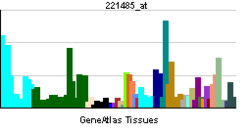B4GALT5
| B4GALT5 | ||||||
|---|---|---|---|---|---|---|
| Identifiers | ||||||
| Aliases | B4GALT5, B4Gal-T5, BETA4-GALT-IV, beta4Gal-T5, beta4GalT-V, gt-V, beta-1,4-galactosyltransferase 5 | |||||
| External IDs | MGI: 1927169 HomoloGene: 3507 GeneCards: B4GALT5 | |||||
| RNA expression pattern | ||||||
  | ||||||
| More reference expression data | ||||||
| Orthologs | ||||||
| Species | Human | Mouse | ||||
| Entrez | ||||||
| Ensembl | ||||||
| UniProt | ||||||
| RefSeq (mRNA) | ||||||
| RefSeq (protein) | ||||||
| Location (UCSC) | Chr 20: 49.63 – 49.71 Mb | Chr 2: 167.3 – 167.35 Mb | ||||
| PubMed search | [1] | [2] | ||||
| Wikidata | ||||||
| View/Edit Human | View/Edit Mouse |
Beta-1,4-galactosyltransferase 5 is an enzyme that in humans is encoded by the B4GALT5 gene.[3][4][5]
This gene is one of seven beta-1,4-galactosyltransferase (beta4GalT) genes. They encode type II membrane-bound glycoproteins that appear to have exclusive specificity for the donor substrate UDP-galactose; all transfer galactose in a beta1,4 linkage to similar acceptor sugars: GlcNAc, Glc, and Xyl. Each beta4GalT has a distinct function in the biosynthesis of different glycoconjugates and saccharide structures. As type II membrane proteins, they have an N-terminal hydrophobic signal sequence that directs the protein to the Golgi apparatus and which then remains uncleaved to function as a transmembrane anchor. By sequence similarity, the beta4GalTs form four groups: beta4GalT1 and beta4GalT2, beta4GalT3 and beta4GalT4, beta4GalT5 and beta4GalT6, and beta4GalT7. The function of the enzyme encoded by this gene is not clear. This gene was previously designated as B4GALT4 but was renamed to B4GALT5. In the literature it is also referred to as beta4GalT2.[5]
References
- ↑ "Human PubMed Reference:".
- ↑ "Mouse PubMed Reference:".
- ↑ Lo NW, Shaper JH, Pevsner J, Shaper NL (Aug 1998). "The expanding beta 4-galactosyltransferase gene family: messages from the databanks". Glycobiology. 8 (5): 517–26. doi:10.1093/glycob/8.5.517. PMID 9597550.
- ↑ Sato T, Furukawa K, Bakker H, Van den Eijnden DH, Van Die I (Feb 1998). "Molecular cloning of a human cDNA encoding β-1,4-galactosyltransferase with 37% identity to mammalian UDP-Gal:GlcNAc β-1,4-galactosyltransferase". Proc Natl Acad Sci U S A. 95 (2): 472–7. doi:10.1073/pnas.95.2.472. PMC 18444
 . PMID 9435216.
. PMID 9435216. - 1 2 "Entrez Gene: B4GALT5 UDP-Gal:betaGlcNAc beta 1,4- galactosyltransferase, polypeptide 5".
Further reading
- Amado M, Almeida R, Schwientek T, Clausen H (2000). "Identification and characterization of large galactosyltransferase gene families: galactosyltransferases for all functions". Biochim. Biophys. Acta. 1473 (1): 35–53. doi:10.1016/S0304-4165(99)00168-3. PMID 10580128.
- Sato T, Aoki N, Matsuda T, Furukawa K (1998). "Differential effect of alpha-lactalbumin on beta-1,4-galactosyltransferase IV activities". Biochem. Biophys. Res. Commun. 244 (3): 637–41. doi:10.1006/bbrc.1998.8327. PMID 9535717.
- Deloukas P, Matthews LH, Ashurst J, et al. (2002). "The DNA sequence and comparative analysis of human chromosome 20". Nature. 414 (6866): 865–71. doi:10.1038/414865a. PMID 11780052.
- Jia L, Young MF, Powell J, et al. (2002). "Gene expression profile of human bone marrow stromal cells: high-throughput expressed sequence tag sequencing analysis". Genomics. 79 (1): 7–17. doi:10.1006/geno.2001.6683. PMID 11827452.
- Xu S, Zhang S, Chen C, et al. (2003). "Over-expression of beta-1,4-galactosyltransferase V increases the growth of astrocytoma cell line". J. Exp. Clin. Cancer Res. 21 (3): 409–14. PMID 12385586.
- Strausberg RL, Feingold EA, Grouse LH, et al. (2003). "Generation and initial analysis of more than 15,000 full-length human and mouse cDNA sequences". Proc. Natl. Acad. Sci. U.S.A. 99 (26): 16899–903. doi:10.1073/pnas.242603899. PMC 139241
 . PMID 12477932.
. PMID 12477932. - Ota T, Suzuki Y, Nishikawa T, et al. (2004). "Complete sequencing and characterization of 21,243 full-length human cDNAs". Nat. Genet. 36 (1): 40–5. doi:10.1038/ng1285. PMID 14702039.
- Sato T, Furukawa K (2004). "Transcriptional regulation of the human beta-1,4-galactosyltransferase V gene in cancer cells: essential role of transcription factor Sp1". J. Biol. Chem. 279 (38): 39574–83. doi:10.1074/jbc.M405805200. PMID 15263012.
- Gerhard DS, Wagner L, Feingold EA, et al. (2004). "The Status, Quality, and Expansion of the NIH Full-Length cDNA Project: The Mammalian Gene Collection (MGC)". Genome Res. 14 (10B): 2121–7. doi:10.1101/gr.2596504. PMC 528928
 . PMID 15489334.
. PMID 15489334. - Jiang J, Chen X, Shen J, et al. (2006). "Beta1,4-galactosyltransferase V functions as a positive growth regulator in glioma". J. Biol. Chem. 281 (14): 9482–9. doi:10.1074/jbc.M504489200. PMID 16461357.
- Sato T, Furukawa K (2007). "Sequential action of Ets-1 and Sp1 in the activation of the human beta-1,4-galactosyltransferase V gene involved in abnormal glycosylation characteristic of cancer cells". J. Biol. Chem. 282 (38): 27702–12. doi:10.1074/jbc.M611862200. PMID 17656364.
- Kitayama K, Hayashida Y, Nishida K, Akama TO (2007). "Enzymes responsible for synthesis of corneal keratan sulfate glycosaminoglycans". J. Biol. Chem. 282 (41): 30085–96. doi:10.1074/jbc.M703695200. PMID 17690104.